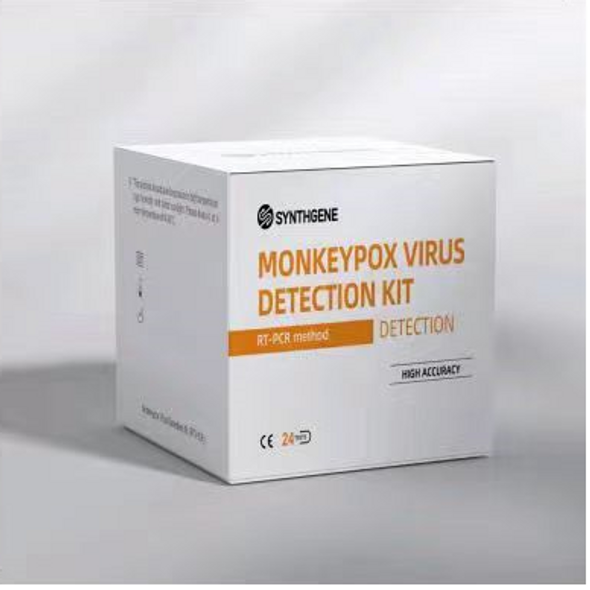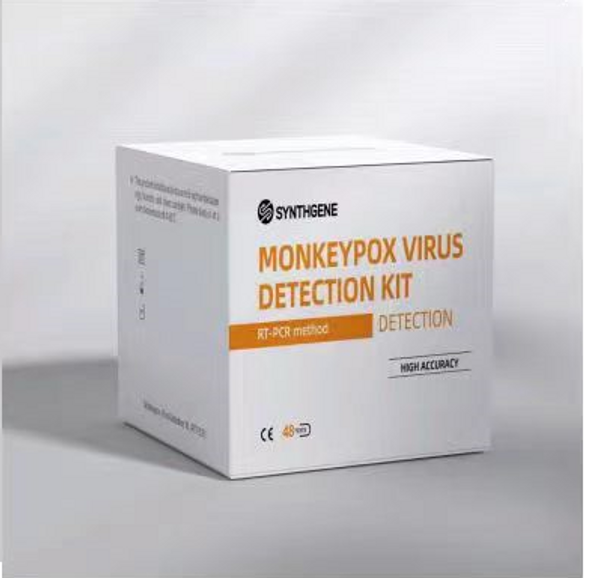MyBioSource
MBS9369680 | Human Monkeypox Virus (MPV) ELISA Kit
- SKU:
- MBS9369680
- Weight:
- 0 KGS
- Shipping:
- Calculated at Checkout
Description
Qualitative Human Monkeypox Virus (MPV) ELISA Kit
Cat.No: MBS9369680
Store All Reagents At 2°C-8°C !
Package Size: 48T/Kit or 96 T/Kit
Valid Period: Six Months (2°C-8°C)
FOR RESEARCH USE ONLY! NOT FOR THERAPEUTIC OR DIAGNOSTIC APPLICATIONS!
1. INTENDED USE AND PRINCIPLE OF THE ASSAY
The kit uses a sandwich enzyme-linked immunosorbent assay (ELISA) to qualitatively analyze Human Monkeypox Virus (MPV) in Human serum, plasma. This kit is in vitro research use only! Not for therapeutic or diagnostic applications!
2. SAMPLE COLLECTION AND STORAGES
Serum - Centrifuge serum for approximately 20 minutes at 1000 × g (or 3000 rpm) within 30 minutes after collection. Collect the supernatants carefully, assay immediately or store samples at -20°C or -80°C. Avoid repeated freeze/thaw cycles.
Plasma - Collect plasma using EDTA or heparin as an anticoagulant. Centrifuge samples for approximately 20 minutes at 1000 × g (or 3000 rpm) within 30 minutes after collection. Collect the supernatants carefully, assay immediately or store samples at -20°C or -80°C. Avoid repeated freeze/thaw cycles.
Other biological fluids - Remove particulates by centrifugation (approximately 20 minutes at 1000 × g (or 3000 rpm) within 30 minutes after collection) and assay immediately or store samples at -20°C. Avoid repeated freeze-thaw cycles.
3. SAMPLE PREPARATION
Serum and plasma to be used within 7 days may be stored at 2-8°C, otherwise samples must be stored at -20 or -80°C to avoid loss of bioactivity and contamination. Avoid freeze-thaw cycles. When performing the assay slowly bring samples to room temperature. The samples should be centrifugated adequately, and hemolyzed samples or samples with granules are not suitable for use in this assay.
4. MATERIALS SUPPLIED
|
Items |
Materials |
Color of covers |
48 well kit |
96 well kit |
|
1 |
Microelisa Stripplate |
--- |
48 well plate |
96 well plate |
|
2 |
Positive Control |
Red |
0.5ml/vial |
0.5ml/vial |
|
3 |
Negative Control |
Green |
0.5ml/vial |
0.5ml/vial |
|
4 |
Sample Diluent |
Blue |
3.0ml×1 bottle |
6.0ml×1 bottle |
|
5 |
HRP-Conjugate Reagent |
Red |
5.0ml×1 bottle |
10.0ml×1 bottle |
|
6 |
20X Wash solution |
White |
15ml×1 bottle |
25ml×1 bottle |
|
7 |
Chromogen Solution A |
Purple |
3.0ml×1 bottle |
6.0ml×1 bottle |
|
8 |
Chromogen Solution B |
Black or Brown |
3.0ml×1 bottle |
6.0ml×1 bottle |
|
9 |
Stop Solution |
Yellow |
3.0ml×1 bottle |
6.0ml×1 bottle |
|
10 |
Closure Plate Membrane |
--- |
2×pieces |
2×pieces |
|
11 |
Manual |
--- |
1×paper |
1×paper |
5. PRECAUTIONS
- The operation should be carried out in strict according to the instructions.
- Avoid cross-contamination when changing tips, and pipette reagents and samples into the center of each well.
- The samples should be transferred into the assay wells within 15 minutes.
- If the blue color too shallow after 15 minutes incubation with the substrates, it may be appropriate to extend the incubation time.
- Do not mix the reagents from different batches
- Chromogenic Substrate B is light-sensitive, please avoid prolonged exposure to light.
6. MATERIALS REQUIRED BUT NOT SUPPLIED
- Distilled water.
- Absorbent papers or paper towels.
- Pipettes and disposable pipette tips.
- An ELISA reader capable of measuring absorbance at 450 nm.
- An incubator which can provide stable incubation conditions up to 37°C±0.5°C.
7. WASHING METHOD
Manual Washing - Dump the incubation mixtures of the wells into a sink or proper waste container. Using pipette or squirt bottle, fill each well completely with Wash Solution (1×), after about one minute's standing, invert and hit the Plate onto absorbent papers or paper towels until no moisture appears. Repeat this procedure four times. Note: Hold the sides of the Plate frame firmly when washing the Plate to assure that all strips remain securely in frame.
Automated Washing - Aspirate all wells, then wash the Plate four times using Wash Buffer (1×). Always adjust your washer to aspirate as much liquid as possible and set fill volume at 350µl/well/wash. After final wash, invert the Plate, and blot dry by hitting the Plate onto absorbent paper or paper towels until no moisture appears.
8. Storage
Please store the Plate and all reagents at 2°C-8°C.
- The valid period of this kit is six months at 2°C-8°C. The kit should not be used beyond the expiration date.
- Wash Solution (1×) - Dilute one volume of Wash Solution (20×) with nineteen volumes of deionized or distilled water. Diluted Wash Solution is stable for one month at 2°C-8°C. Undiluted Wash Solution and other reagents are stable for six months at 2°C-8°C.
- When the kit is opened, please used up all the Plate as soon as possible after removed the Plate from the foil pouch. The Plate is detachable, so please return the unused wells to the foil pouch containing the desiccant pack, and reseal along entire edge of zip-seal for preventing damps. The remaining reagents still need to be stored at 2°C-8°C.
9. ASSAY PROCEDURE
- First, check the Plate and equipment before your experiments and make sure they are no problem, check the labels and the color of the covers of the vials/bottles and make sure they are matched and no mistake. Bring all reagents and samples to room temperature (18°C-25°C) naturally for 30min before starting assay procedures. DO NOT use hot water baths to thaw samples or reagents. If necessary, doing a low - speed centrifugation for one or two seconds to concentrate the Positive/Negative Controls to the bottom of the vials. The Plate is detachable, detach unused strips from the Plate frame, return them to the foil pouch with the desiccant pack, and reseal for preventing damps.
- Set Positive Control wells, Negative Control wells and Sample wells. Add Positive Control 50µl to each Positive Control well, add Negative Control 50µl to each Negative Control well. Add sample 50µl to each Sample wells. Note:
This kit is designed to be used with undiluted samples.
PC: Positive Control; NC: Negative Control; S01-S94: Sample
1 2 3 4 5 6 7 8 9 10 11 12
- PC NC S01 S02 S03 S04 S05 S06 S07 S08 S09 S10
- S11 S12 S13 S14 S15 S16 S17 S18 S19 S20 S21 S22
- S23 S24 S25 S26 S27 S28 S29 S30 S31 S32 S33 S34
- S35 S36 S37 S38 S39 S40 S41 S42 S43 S44 S45 S46
- S47 S48 S49 S50 S51 S52 S53 S54 S55 S56 S57 S58
- S59 S60 S61 S62 S63 S64 S65 S66 S67 S68 S69 S70
- S71 S72 S73 S74 S75 S76 S77 S78 S79 S80 S81 S82
- S83 S84 S85 S86 S87 S88 S89 S90 S91 S92 S93 S94
- Add 100µl of HRP-conjugate reagent to Positive Control wells, Negative Control wells and Sample wells, cover with an adhesive strip and incubate for 60 minutes at 37°C.
- Wash the Plate 4 times.
- Add Chromogen Solution A 50µl and Chromogen Solution B 50µl to each well Gently mix and then protect from light to incubate for 15 minutes at 37°C.
- Add 50µl Stop Solution to each well. The color in the wells should change from blue to yellow. If the color in the wells is green or the color change does not appear uniform, gently tap the Plate to ensure thorough mixing.
- Read the Optical Density (O.D.) at 450 nm using an ELISA reader within 15 minutes after adding Stop Solution (Around 5 minutes is the best time.).








